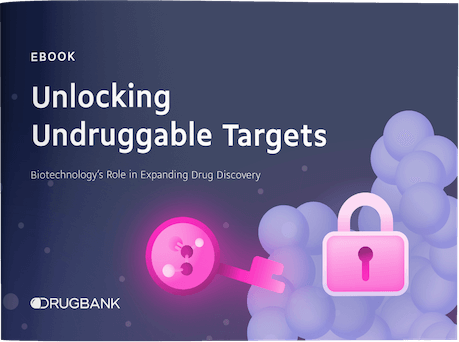2-[2-ETHANESULFONYLAMINO-3-(5-PROPOXY-1H-INDOL-3-YL)-PROPIONYLAMINO]-PENTANEDIOIC ACID 5-AMIDE 1-(4-CARBAMIMIDOYL-BENZYLAMIDE)
Explore a selection of our essential drug information below, or:
Identification
- Generic Name
- 2-[2-ETHANESULFONYLAMINO-3-(5-PROPOXY-1H-INDOL-3-YL)-PROPIONYLAMINO]-PENTANEDIOIC ACID 5-AMIDE 1-(4-CARBAMIMIDOYL-BENZYLAMIDE)
- DrugBank Accession Number
- DB04606
- Background
Not Available
- Type
- Small Molecule
- Groups
- Experimental
- Structure
- Weight
- Average: 613.728
Monoisotopic: 613.268252705 - Chemical Formula
- C29H39N7O6S
- Synonyms
- Not Available
Pharmacology
- Indication
Not Available
 Reduce drug development failure ratesBuild, train, & validate machine-learning modelswith evidence-based and structured datasets.Build, train, & validate predictive machine-learning models with structured datasets.
Reduce drug development failure ratesBuild, train, & validate machine-learning modelswith evidence-based and structured datasets.Build, train, & validate predictive machine-learning models with structured datasets.- Contraindications & Blackbox Warnings
 Prevent Adverse Drug Events TodayTap into our Clinical API for life-saving information on contraindications & blackbox warnings, population restrictions, harmful risks, & more.Avoid life-threatening adverse drug events with our Clinical API
Prevent Adverse Drug Events TodayTap into our Clinical API for life-saving information on contraindications & blackbox warnings, population restrictions, harmful risks, & more.Avoid life-threatening adverse drug events with our Clinical API- Pharmacodynamics
Not Available
- Mechanism of action
Target Actions Organism UCoagulation factor VII Not Available Humans - Absorption
Not Available
- Volume of distribution
Not Available
- Protein binding
Not Available
- Metabolism
- Not Available
- Route of elimination
Not Available
- Half-life
Not Available
- Clearance
Not Available
- Adverse Effects
 Improve decision support & research outcomesWith structured adverse effects data, including: blackbox warnings, adverse reactions, warning & precautions, & incidence rates. View sample adverse effects data in our new Data Library!Improve decision support & research outcomes with our structured adverse effects data.
Improve decision support & research outcomesWith structured adverse effects data, including: blackbox warnings, adverse reactions, warning & precautions, & incidence rates. View sample adverse effects data in our new Data Library!Improve decision support & research outcomes with our structured adverse effects data.- Toxicity
Not Available
- Pathways
- Not Available
- Pharmacogenomic Effects/ADRs
- Not Available
Interactions
- Drug Interactions
- This information should not be interpreted without the help of a healthcare provider. If you believe you are experiencing an interaction, contact a healthcare provider immediately. The absence of an interaction does not necessarily mean no interactions exist.Not Available
- Food Interactions
- Not Available
Categories
- Drug Categories
- Not Available
- Chemical TaxonomyProvided by Classyfire
- Description
- This compound belongs to the class of organic compounds known as dipeptides. These are organic compounds containing a sequence of exactly two alpha-amino acids joined by a peptide bond.
- Kingdom
- Organic compounds
- Super Class
- Organic acids and derivatives
- Class
- Carboxylic acids and derivatives
- Sub Class
- Amino acids, peptides, and analogues
- Direct Parent
- Dipeptides
- Alternative Parents
- Glutamine and derivatives / Serotonins / N-acyl-alpha amino acids and derivatives / Alpha amino acid amides / 3-alkylindoles / Alkyl aryl ethers / Benzene and substituted derivatives / Substituted pyrroles / N-acyl amines / Organosulfonamides show 12 more
- Substituents
- 3-alkylindole / Alkyl aryl ether / Alpha-amino acid amide / Alpha-amino acid or derivatives / Alpha-dipeptide / Amidine / Aminosulfonyl compound / Aromatic heteropolycyclic compound / Azacycle / Benzenoid show 35 more
- Molecular Framework
- Aromatic heteropolycyclic compounds
- External Descriptors
- Not Available
- Affected organisms
- Not Available
Chemical Identifiers
- UNII
- Not Available
- CAS number
- Not Available
- InChI Key
- UHMORXPPNXDKHY-LOSJGSFVSA-N
- InChI
- InChI=1S/C29H39N7O6S/c1-3-13-42-21-9-10-23-22(15-21)20(17-33-23)14-25(36-43(40,41)4-2)29(39)35-24(11-12-26(30)37)28(38)34-16-18-5-7-19(8-6-18)27(31)32/h5-10,15,17,24-25,33,36H,3-4,11-14,16H2,1-2H3,(H2,30,37)(H3,31,32)(H,34,38)(H,35,39)/t24-,25+/m0/s1
- IUPAC Name
- (2S)-N-[(4-carbamimidoylphenyl)methyl]-2-[(2R)-2-ethanesulfonamido-3-(5-propoxy-1H-indol-3-yl)propanamido]pentanediamide
- SMILES
- CCCOC1=CC2=C(NC=C2C[C@@H](NS(=O)(=O)CC)C(=O)N[C@@H](CCC(N)=O)C(=O)NCC2=CC=C(C=C2)C(N)=N)C=C1
References
- General References
- Not Available
- External Links
- PubChem Compound
- 5326888
- PubChem Substance
- 46507880
- ChemSpider
- 4484180
- ZINC
- ZINC000003989246
- PDBe Ligand
- 5PI
- PDB Entries
- 1wv7
Clinical Trials
- Clinical Trials
Clinical Trial & Rare Diseases Add-on Data Package
Explore 4,000+ rare diseases, orphan drugs & condition pairs, clinical trial why stopped data, & more. Preview package Phase Status Purpose Conditions Count Start Date Why Stopped 100+ additional columns Unlock 175K+ rows when you subscribe.View sample data
Pharmacoeconomics
- Manufacturers
- Not Available
- Packagers
- Not Available
- Dosage Forms
- Not Available
- Prices
- Not Available
- Patents
- Not Available
Properties
- State
- Solid
- Experimental Properties
- Not Available
- Predicted Properties
Property Value Source Water Solubility 0.0132 mg/mL ALOGPS logP 1.01 ALOGPS logP -0.34 Chemaxon logS -4.7 ALOGPS pKa (Strongest Acidic) 9.67 Chemaxon pKa (Strongest Basic) 11.38 Chemaxon Physiological Charge 1 Chemaxon Hydrogen Acceptor Count 8 Chemaxon Hydrogen Donor Count 7 Chemaxon Polar Surface Area 222.35 Å2 Chemaxon Rotatable Bond Count 16 Chemaxon Refractivity 172.77 m3·mol-1 Chemaxon Polarizability 64.89 Å3 Chemaxon Number of Rings 3 Chemaxon Bioavailability 0 Chemaxon Rule of Five No Chemaxon Ghose Filter No Chemaxon Veber's Rule No Chemaxon MDDR-like Rule Yes Chemaxon - Predicted ADMET Features
Property Value Probability Human Intestinal Absorption + 1.0 Blood Brain Barrier + 0.6842 Caco-2 permeable - 0.6995 P-glycoprotein substrate Substrate 0.7882 P-glycoprotein inhibitor I Non-inhibitor 0.7786 P-glycoprotein inhibitor II Non-inhibitor 0.9722 Renal organic cation transporter Non-inhibitor 0.7528 CYP450 2C9 substrate Non-substrate 0.7145 CYP450 2D6 substrate Non-substrate 0.7742 CYP450 3A4 substrate Substrate 0.574 CYP450 1A2 substrate Non-inhibitor 0.7539 CYP450 2C9 inhibitor Non-inhibitor 0.6601 CYP450 2D6 inhibitor Non-inhibitor 0.8692 CYP450 2C19 inhibitor Non-inhibitor 0.6251 CYP450 3A4 inhibitor Non-inhibitor 0.5881 CYP450 inhibitory promiscuity High CYP Inhibitory Promiscuity 0.5141 Ames test Non AMES toxic 0.613 Carcinogenicity Non-carcinogens 0.7237 Biodegradation Not ready biodegradable 0.9968 Rat acute toxicity 2.5330 LD50, mol/kg Not applicable hERG inhibition (predictor I) Weak inhibitor 0.9155 hERG inhibition (predictor II) Inhibitor 0.5401
Spectra
- Mass Spec (NIST)
- Not Available
- Spectra
- Chromatographic Properties
Collision Cross Sections (CCS)
Adduct CCS Value (Å2) Source type Source [M-H]- 228.107 predictedDeepCCS 1.0 (2019) [M+H]+ 229.93188 predictedDeepCCS 1.0 (2019) [M+Na]+ 235.53772 predictedDeepCCS 1.0 (2019)
Targets

Build, predict & validate machine-learning models
Use our structured and evidence-based datasets to unlock newinsights and accelerate drug research.
Use our structured and evidence-based datasets to unlock new insights and accelerate drug research.
- Kind
- Protein
- Organism
- Humans
- Pharmacological action
- Unknown
- General Function
- Initiates the extrinsic pathway of blood coagulation. Serine protease that circulates in the blood in a zymogen form. Factor VII is converted to factor VIIa by factor Xa, factor XIIa, factor IXa, or thrombin by minor proteolysis. In the presence of tissue factor and calcium ions, factor VIIa then converts factor X to factor Xa by limited proteolysis. Factor VIIa will also convert factor IX to factor IXa in the presence of tissue factor and calcium
- Specific Function
- calcium ion binding
- Gene Name
- F7
- Uniprot ID
- P08709
- Uniprot Name
- Coagulation factor VII
- Molecular Weight
- 51593.465 Da
Drug created at September 11, 2007 17:48 / Updated at June 12, 2020 16:52


